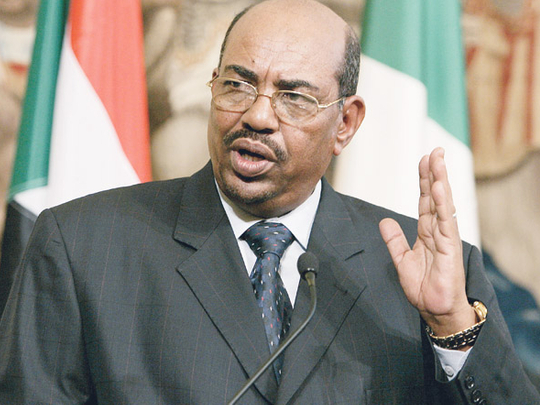
Khartoum: Sudan’s President Omar Al Bashir on Monday appealed for a political and economic renaissance in his country ravaged by war, poverty and political turmoil.
It was the latest call Al Bashir has made in the past year for a broad political dialogue, including with the country’s armed insurgents.
But this time, he made his appeal directly to opposition figures — including breakaway members of his own party — who joined the audience of government-linked parties, cabinet members and foreign diplomats for his speech at a conference hall along the Blue Nile.
“We in the National Congress Party are calling for all Sudanese to participate in this renaissance,” he said in the speech designed to address urgent calls for reform in his 25-year-old regime, but which fell short of critics’ expectations.
His speech, billed as a major event by his party, follows a December cabinet shuffle which analysts said left the president more firmly in control.
Critics of Al Bashir’s regime have become increasingly vocal since the government slashed fuel subsidies in September, leading to the worst urban unrest of his rule.
The Islamist Hassan Al Turabi, a leading figure behind the 1989 coup that brought Al Bashir to power, was among those present on Monday, marking the first time in 14 years that he has attended an NCP event.
He broke away in 2000 and formed the opposition Popular Congress.
“The speech did not meet our expectations,” Al Turabi told reporters after.
“I didn’t hear anything about freedom of political activities, nor did I hear anything about media freedom.”
Al Turabi sat beside a more recent NCP dissident, Ghazi Salahuddin Atabani, a former Al Bashir adviser who in December launched a new “Reform” party.
Next to the two dissidents was opposition Umma Party leader Sadiq Al Mahdi, who was overthrown as prime minister by Al Bashir’s bloodless coup.
Analysts say Umma has been most closely courted by the government, but Al Mahdi declined to comment on Al Bashir’s speech, saying he would study it first.
Al Bashir did not reveal detailed initiatives but said the renaissance must address four areas: peace, political freedom, poverty reduction and “Sudanese identity”.
“Peace is the top priority,” said the leader, who is wanted by the International Criminal Court for alleged war crimes, crimes against humanity and genocide in the 11-year-old conflict in Sudan’s Darfur region.
“No development, political or economic, can come without peace,” said Al Bashir.
In addition to the long-running rebel-government clashes in Darfur, the government for more than two years has been fighting ethnic insurgents in the Kordofan districts and Blue Nile state.
The uprisings have been fuelled by complaints of economic and political neglect by the Arab-dominated regime.
Sudan ranks near the bottom of international indexes of corruption, human development and press freedom.
But Al Bashir said: “The freedom of people has to be respected.”
He added that freedom of political party activity “is not only limited to elections”.
Al Turabi and other opposition figures have been periodically detained and their media restricted.
During the September fuel-price unrest, security forces are believed to have killed more than 200 demonstrators, Amnesty International said, but the government has given a toll of less than half that figure.
Analysts said the spontaneous protests pointed to an urgent need for change by the regime.
The NCP moved to expel Atabani and two other dissidents who signed a memorandum which said the government’s response to the protests betrayed its Islamic foundations.
Farouk Abu Eisa, who heads an alliance of all major opposition parties except Umma, said ahead of Al Bashir’s speech that he wanted to hear the president apologise for the “suffering” his policies had caused, including the September killings and the wars throughout the country.
“He has to declare right away a ceasefire,” Eisa said.
Al Bashir said the country’s “unproductive political wrangling” should end but he made no direct mention of a cessation of hostilities on the battlefield.
And there was no apology.
Khalid Tigani, who helped found a movement seeking a more inclusive democratic system for Sudan, said that after much talk it was time for Al Bashir to “prove that he is serious” about political dialogue to address Sudan’s multiple problems.












